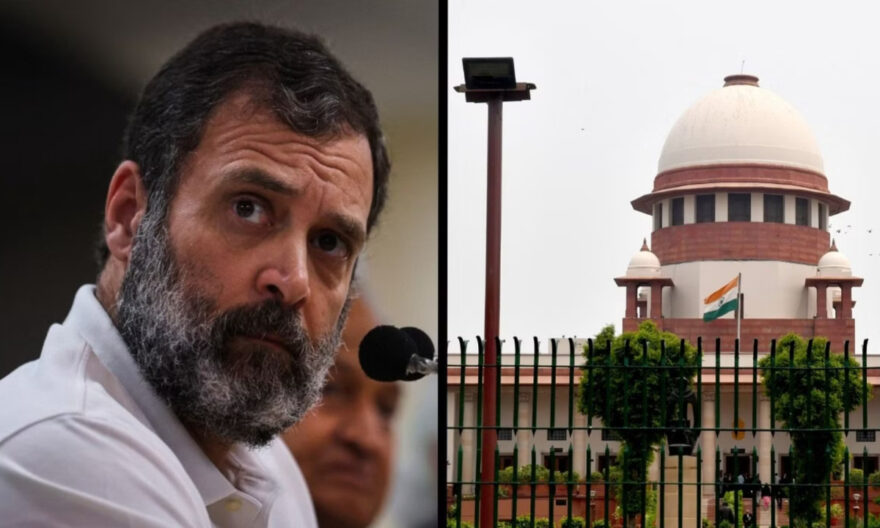
Purnesh Modi, who filed a defamation case against Rahul Gandhi, has filed his affidavit in the Supreme Court on Monday. In his affidavit, Purnesh Modi has said that Rahul Gandhi is of arrogant nature. He intentionally insulted the Modi surname. Purnesh Modi has also said that the court also gave an opportunity to Rahul Gandhi to express regret on his statement but Rahul Gandhi did not do so. Rather maintained his obstinate attitude in front of the court.
Rahul Gandhi filed a petition in the Supreme Court challenging the Gujarat High Court order. Even before this petition, Purnesh Modi had filed a caveat. On July 21, during the hearing on Rahul Gandhi’s petition, the Supreme Court had given notice to Purnesh Modi and asked him to file a reply, on which Purnesh has filed this affidavit today.
Purnesh Modi has also said that therefore the decision of the Lower Court and the High Court is correct.
Purnesh Modi says in his affidavit, Rahul Gandhi maliciously and recklessly used scurrilous words against a large and totally blameless class of persons. “The statement was made out of personal hatred towards an elected Prime Minister of the country, and the extent of hatred was so great that the Petitioner was impelled to cast grossly defamatory aspersions on persons who incidentally bore the same surname as the Prime Minister.”
As President of a national- level political party at the time of the speech, RG expected to “set high standards of political discourse in the country”
No reason to brand entire class of people as thieves just because they bear the same surname as the Prime Minister”. Purnesh Modi Filed a 21 pages long Affidavit in Supreme court.
Purnesh Modi pointed out that the petitioner (Rahul Gandhi) was the president of a national-level political party, might engage in using slanderous language in political discussions, it is unjust to label an entire community as thieves merely because they share the same surname as the Prime Minister.
With reference to Section 8(3) of the Representation of People Act, 1951, he asserted that if the legislature intended disqualification to be triggered only in cases of moral turpitude, it would have explicitly stated so. According to him, the offense of defamation under section 500 of the Indian Penal Code itself falls under the category of moral turpitude.
Additionally, he brought to attention that Rahul Gandhi is currently on bail in the National Herald case and facing another case for defamation of Vinayak Savarkar. The petitioner also argued that during the trial court’s sentencing, Gandhi displayed an unrepentant attitude, claiming, “he was not a Savarkar but a Gandhi.”
The petitioner further cited a past instance where the Supreme Court reprimanded Gandhi for wrongly attributing the phrase “chowkidar chor” (watchman is a thief) and compelled him to issue an unconditional apology in a contempt proceeding.
The petitioner contended that Gandhi’s attitude of “arrogant entitlement, insensitivity to a community, and contempt for law” should disqualify him from seeking any relief.
What is the Story of Defamation Case Against Rahul Gandhi
Rahul Gandhi, a Congress leader and former MP, faced controversy over his statement, “why all thieves share the Modi surname,” made during a political rally in Karnataka’s Kolar in 2019. Purnesh Modi, a Bharatiya Janata Party MLA and former Gujarat minister, filed a complaint under Sections 499 and 500 of the Indian Penal Code, 1860, accusing Gandhi of defaming everyone with the surname “Modi.”
In March, a local court in Surat district, Gujarat, convicted Gandhi and sentenced him to two years’ imprisonment. Although the sentence was suspended, he was disqualified as a Lok Sabha member the next day under Article 102(1)(e) of the Constitution read with Section 8 of the Representation of the People Act, 1951. The Act states that a person will be disqualified from holding office if convicted and sentenced to imprisonment for two years or more, and this disqualification continues for an additional six years after release.
Gandhi’s application for a stay on his conviction in the criminal defamation case was rejected by the sessions court, but he was granted bail pending the appeal. He filed a criminal revision application against the ruling, which was later dismissed by the High Court. The High Court observed that Gandhi’s statement concerned a significant identifiable group, the “Modi” community, and not just an individual. As a senior leader, Gandhi had a duty to ensure that his political activities or utterances did not jeopardize the dignity and reputation of such a group.
Gandhi has moved the Supreme Court, challenging the Gujarat High Court’s decision to deny his request for a stay on his conviction. He maintains that he had no malicious intent or intention to defame the complainant.
The matter is scheduled for a hearing on August 4, after the Supreme Court issued a notice on Gandhi’s plea on July 21.




